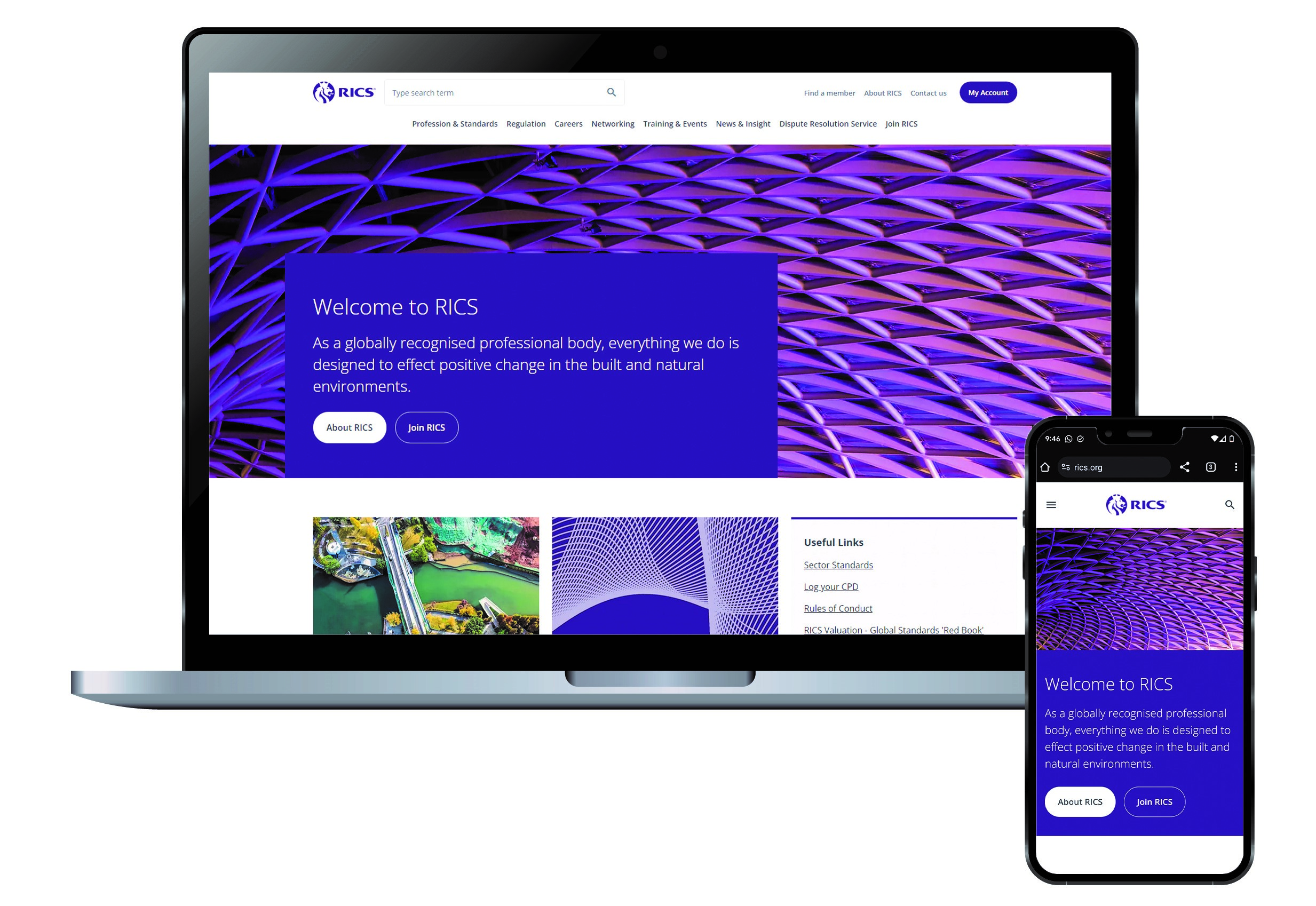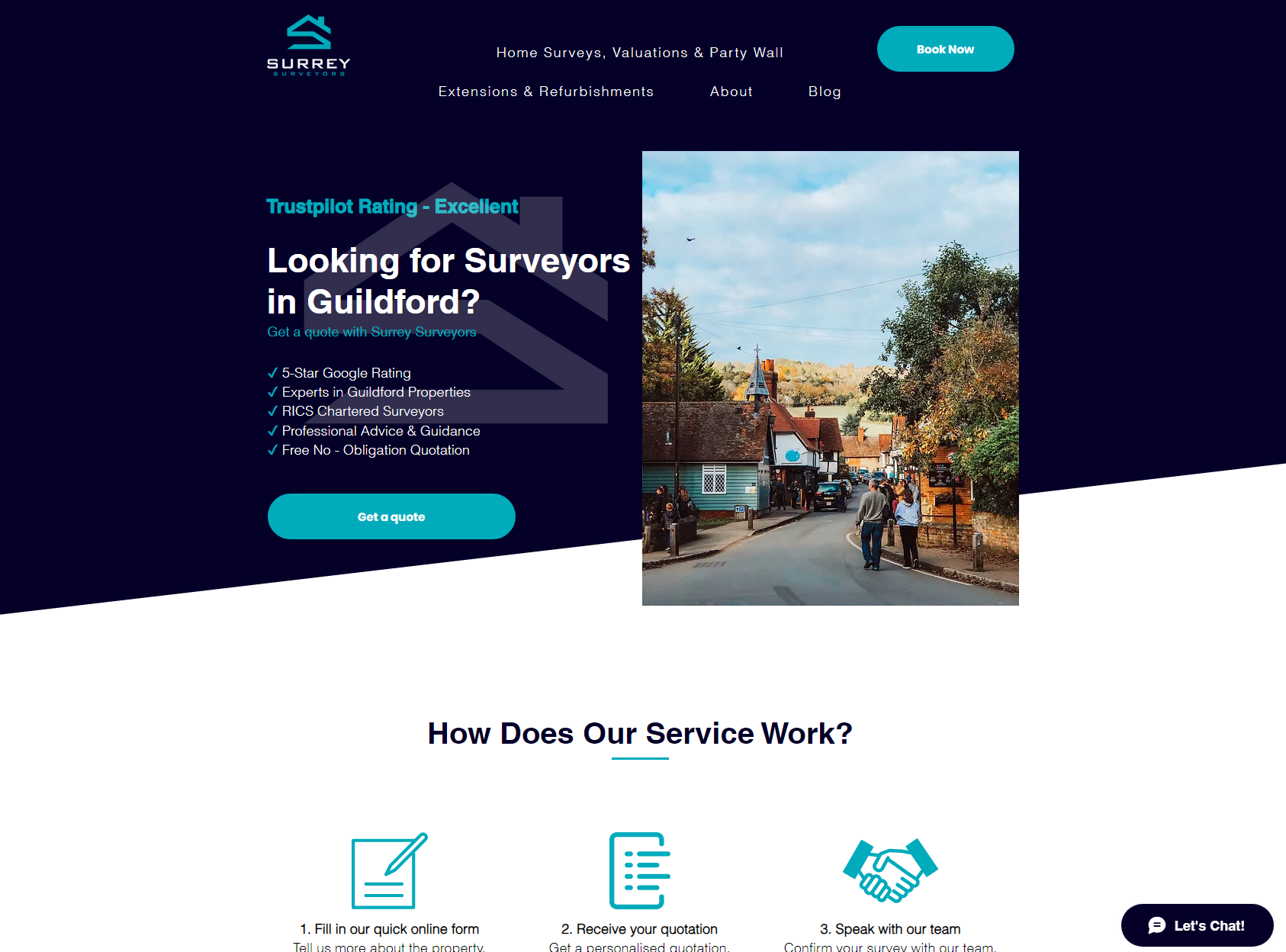
With search engines now being many people's gateway to information and services, it is essential for businesses to optimise their websites to enhance their visibility in search results.
For surveying firms – especially small and medium-sized enterprises (SMEs) that may have fewer resources at their disposal compared with larger companies – search engine optimisation (SEO) can provide a competitive advantage by improving access to potential clients and projects as well as building a reputation within the sector.
This article explores techniques for improving on-page SEO, which enables individual web pages to improve their position in rankings and attract relevant organic traffic (i.e. from unpaid search results) without paying for ads.
Identify keywords by asking what users ask
Before creating a webpage, ask yourself what the user wants to find. This will help both them and the search engine find your webpage.
There are four types of user intent.
- Informational: a user seeks information or answers to a question; a common informational question is 'How much is a homebuyers survey?'
- Navigational: a user seeks a specific website or page, such as 'Acme Surveyors'.
- Commercial: a user is investigating services, reviews or looking for a discount, and may search, for instance, for 'discount surveys'.
- Transactional: a user intends to make a purchase, for example by using the search term 'homebuyer survey near me'.
Once you have considered the search intent, you can begin keyword research based on your area of expertise in surveying. Many free and paid tools are available online to find keywords that your clents will use when looking for surveying services, including Google Keyword Planner, Ahrefs, SEMrush or SE Ranking.
With your keyword identified, you can build your website around it by doing the following.
- Ensure the keyword is included in the page heading (H1).
- Use the keyword within the first 100–150 words and a few times on the page. However, it should not occur too many times – make it appear naturally within the text.
- Include the keyword in the page's web address.
- Also include it in the meta title and description; that is, the short bits of text that you see on the search results pages. Locate it towards the beginning of each.
- Use related keywords but avoid keyword stuffing – the idea is to give the best answer to the user's question.
Updates and structure can improve results
Given the abundance of online material and the limit to how much you can write about a specific topic, consider improving and updating your pages regularly.
For example, combine elements of different blogs into a better article that answers a user's questions in one place. Search engines rank regularly updated content higher because it is more likely to be relevant to new queries.
Headings help search engines better understand the content of the page as well. Using these in a sequential order can mean your page ranks higher because it can be more easily understood. You can also use the secondary headings (H2–H6) to include additional and relevant keywords in a natural way. For example:
- <H1>Level 2 Home Survey<H1>
- <H2>How much does a level 2 Home Survey cost?<H2>
- <H2>How long does the survey take?<H2>
The RICS homepage is a good example as it uses sequentially ordered headings and great imagery.
Links and other resources prove valuable
Be sure to link between relevant pages of your website in the text. When doing so, avoid non-descriptive links such as 'click here'; instead, link to the words themselves – such as 'level 3 building survey' – as these are easier for a search engine to understand.
It can also help users if you link to resources outside your site. External links to trusted resources help search engines see that your pages provide high-quality information.
If you have access to images and videos that you can share – for which you own the copyright or have the owner's permission to use – you can include these in your website. Pages with images and videos not only achieve better organic search results but also look more appealing. For example, Harrison Clarke Surveyors use YouTube videos effectively to explain its services and offer other information.
Don't forget to add alt tags to any pictures or videos as well. A tag consists of a single line of text for anyone using a screen reader, as the accessibility of content is a search ranking factor. You can include your page keyword, but only if it is relevant to the image.

An effective alt tag for this image could be: 'building surveyor conducting a visual inspection of a new property'
Schema mark-up, or structured data, is the code that search engines use to understand webpages better. Website builders like Wix support the addition of this information with their SEO tools. You can also use websites such as TechnicalSEO and third-party plugins to help make and add it for you.
This takes standard information from your pages and puts it in a scripted format that search engines can use for things like rich snippets.
Developing a backlink strategy
SEO goes beyond your own website, though, and off-page strategies can include building backlinks, guest posting, social media and brand mentions.
A backlink is when an external website links to yours. Depending on the type of link used, it can add authority to your website when it is crawled and evaluated by search engines, which can help it rank higher in the search results.
The quality of these backlinks is important. It's best to avoid low-quality backlinks altogether, which are not as valuable as a single, high-quality backlink.
You should never pay for backlinks, a technique referred to as black-hat SEO. Certain websites may offer thousands of backlinks for a meagre cost, but these will severely damage your SEO efforts and violate Google guidelines. You put yourself at risk of receiving a manual action penalty from Google.
It's also important to take stock of your existing backlinks, which can be identified using free tools such as Google Search Console or Screaming Frog's SEO Spider. You should check whether links found on a large number of low-quality domains, or a few high-quality ones. If you have extremely low-quality domains pointing to your site, it's important to secure some higher-quality backlinks. Quality is better than quantity.
Collaboration helps foster online community
Paid SEO tools allow you to research your competitors' backlinks, helping you understand their strategy and, in some cases, mimic them. If a competitor has backlinks to a broken page on their website, it's a good opportunity to contact the website owner and offer to provide a relevant working page for them.
You can also reach out to other sites in the surveying professions. If they have an upcoming article to which you can write or contribute, you can provide a backlink to your website.
Or, if a competitor has outdated content on another website, let them know you could update this for them. You can also offer to do the same in return if you have a relevant article coming up to which they could contribute.
Regularly posting on social media is another excellent method for off-page SEO to generate traffic to your website and keep clients updated. Share new content or business interactions in the surveying community online and interact with other local businesses on social media to increase your visibility.
The rule for backlinks also applies to social media: buying followers increases your risk of being delisted on a social network. Avoid trying to manipulate your followers, as a natural following gained over time will be far more valuable.
Are your pages mobile-friendly?
As technology evolves, your website must adapt to provide a fast yet stable experience for different users. In 2020, Google introduced Core Web Vitals as a ranking signal, and in 2021, it switched to a mobile-first approach given its users' device preferences.

RICS homepage responsive layout: desktop and mobile views
It's essential, then, for your website to meet the following requirements.
- Responsive: ensure your webpages respond to different screen sizes and orientations so that content is not lost.
- Clear layout: avoid a cluttered design that makes content difficult to see or requires zooming in when viewed on a mobile device.
- Fonts and text size: avoid using small or overdesigned fonts, to ensure text is legible.
- Optimised images: reduce the size of image as much as possible without losing quality; you can consider using the WebP file format.
- Touch-friendly buttons: buttons should be large enough and not too close together.
- Fast loading times: a content delivery network (CDN) can help your pages load more quickly.
- Easy navigation: use hamburger-style menus, as they help declutter screen space.
Test whether your web page is mobile-friendly and its speed using a Google page speed insight test.
Understand and optimise for your local markets
Even if you have multiple branches, optimising for local SEO will help generate easily accessible revenue and build local brand awareness. Use third-party tools to research locally specific keywords. Ranking for these will be less complicated and will be unique to your area of operation.
Implementing a location-based landing page strategy for Surrey Surveyors, for instance, recently helped it rank on the first page of search results for many relevant local keywords by create landing pages around location-based keywords (e.g. 'surveyors in Guildford').

Surrey Surveyors homepage © Surrey Surveyors LTD
Being included in local directories is also useful. For example, Google Business Profile is a free directory that allows you to show your services, opening hours, reviews and more. Ensure that your services reflect your target keywords for added benefit.
If your business is already featured on several local directories, then ensure your name, address and phone number are consistent on each.
Enabling RICS SME members to thrive
At RICS, we want our SME members to flourish. Our SME Business Support Hub is a great place to start finding out more.
Whether an experienced or start-up SME, you'll find tailored support and resources, such as:
- guidance on business models
- statutory requirements
- insurance
- financial management
- marketing and promotion
- practical advice on aspects of buying, selling or leasing property.
We also send a monthly SME newsletter, sharing relevant support, insight and knowledge. You can sign up for this by emailing RICS directly.
Our quarterly UK Economy and property market update is also designed with SMEs in mind, providing the kind of detailed analysis and insight that may otherwise be out of reach. We conduct regular webinars as well, to take members through the latest updates and provide a forum for their questions.

